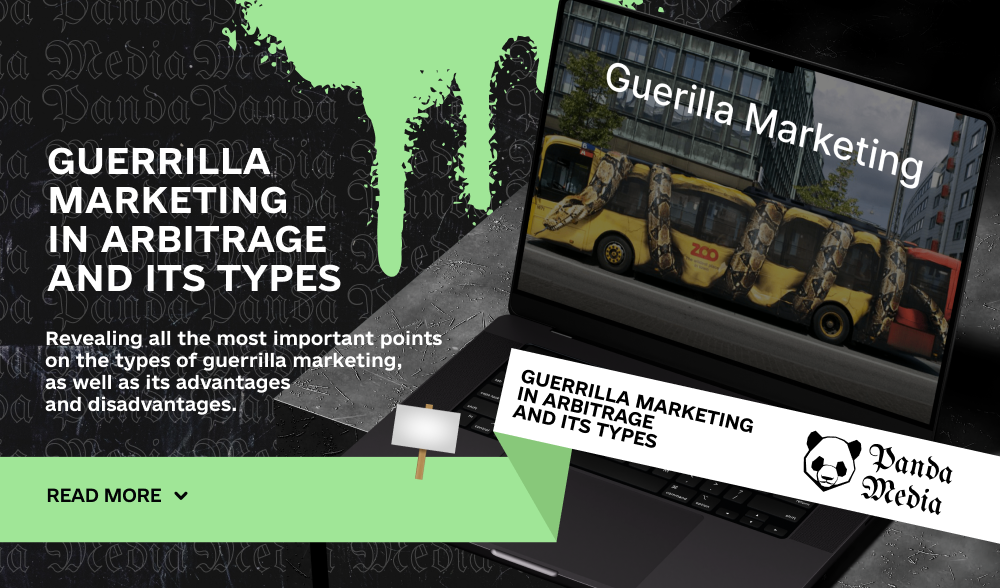Don't miss interesting news

The main objective of guerrilla marketing is to minimize costs when achieving the goal, while using methods that evoke strong emotions in consumers, including not only positive ones but also such emotions as anger or irritation. Most often, the goal is to shock or surprise the audience.

Take, for example, the Game of Thrones ad in the New York Times. Unexpectedly for the reader, the shadow of a dragon appears on the pages of the newspaper, which can make them involuntarily look up into the sky, believing for a moment that it is Daenerys Targaryen riding a dragon above them. Although this is unlikely, it creates a certain impression and remains in the memory.
Before choosing a guerrilla marketing strategy, it is important to have a deep understanding of your target audience, because, without this understanding, no tactic will be effective. The first step is to thoroughly study the needs and interests of your target audience, after which you can choose the most appropriate promotion method.
One of the guerrilla marketing methods is viral marketing, which is highly effective in terms of conversion. This strategy is based on the fact that information about a product or service spreads quickly and efficiently without the direct involvement of the company. Users, followers, and customers share information via social networks, messengers, and even in casual conversations, creating a buzz around a product or service. The main task here is to create content that is attractive enough to be shared among the target audience.
For example, when people automatically hum the number 8 800 … after watching a memorable ad, it demonstrates the success of viral marketing.
This type of guerrilla marketing is aimed at making customers not realize that they are moving through a sales funnel. It is often used in film production and television series, where a company sponsors a project and its products appear unobtrusively in the frame.
For an attentive viewer, the brand is immediately recognizable, while others notice the product already on the store shelf, mentally associating it with a popular character: “This is exactly what the main character had!”
This type of guerrilla marketing blends harmoniously into the everyday environment, avoiding explicit advertising. For example, by fire safety requirements, an “Exit” sign must be in every building. Placing a small poster next to it can be an effective advertisement for, for example, a men’s deodorant without standing out from the general context.
This method involves creating a “trap” for the client. An example is when you are watching a football match on TV and suddenly a poster with a promotional code from a bookmaker appears among the fans. Given the well-known gambling habits of football fans, this approach can effectively draw attention to betting services.
This type of guerrilla marketing is often associated with large-scale outdoor advertising, but it can also be implemented through smaller and budget campaigns. The main thing here is an individual approach to the presentation, as the creative is not always directly related to the product or service being promoted.

Maintaining a balance between conversion and audience loyalty when using guerilla marketing can be quite difficult. One mistake can lead to the loss of the entire budget. We have compiled a table of the pros and cons of this type of advertising for you.
Affordable cost
Sometimes, an advertising campaign can be carried out with minimal costs.
Creative freedom
You are allowed to create and implement the most daring ideas for your brand.
Better understanding of your audience
By analyzing people’s reactions, you better understand your brand’s positioning in the market.
Opportunity to go viral online
A campaign can spread on social media on its own, thanks to the brand, its followers, and even the media, increasing its reach without the direct involvement of the promotion team.
Establishing partnerships
A successful campaign can pave the way for mutually beneficial partnerships with venues, organizations, parks, festivals, or other brands.
Risk of failure
When going public, a brand risks facing negative consequences if something goes wrong.
Possibility of losses
An unsuccessful campaign can be detrimental to the company’s finances, especially if all risks are not taken into account, including unforeseen circumstances such as unfavorable weather conditions or an escalating political situation.
The threat of losing the trust of the existing audience
Using covert methods or aggressive marketing can drive away even the most loyal customers.
Risks of legal and reputational problems
The campaign may lead to legal disputes or negative feedback against the brand.
Risk of breaking partnerships
An offer that is too unusual may encourage a partner to refuse to cooperate and invest in similar marketing initiatives.
Indeed, the risks in such marketing campaigns can be significant and lead to serious losses. For example, in 2005, there was an incident with Snapple, which tried to set a Guinness World Record by creating a huge ice cream statue 7.5 meters high in a New York park. However, due to an unforeseen rapid melting, the park was flooded with a sweet sticky mass. As a result, the park had to be closed for two days, and its cleanup fell to firefighters, who had to use a strong water jet to remove the syrup. The company was fined for this failure and did not dare to experiment with such things again.
The effectiveness of guerrilla marketing is due to its unique and memorable nature. However, it is important to realistically assess your resources and closely monitor the audience’s reaction. Otherwise, there is a risk of losing your budget and not getting the expected traffic.